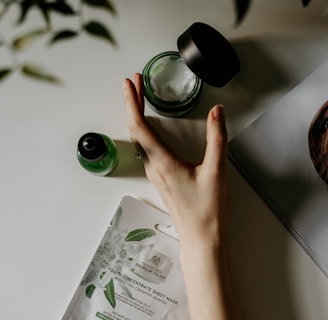The Role of Antioxidants in Anti-Aging Skincare
AGING
2/11/20255 min read


Understanding Antioxidants: What They Are and How They Work
Antioxidants are naturally occurring compounds that play a crucial role in maintaining the body's overall health, particularly concerning skin vitality and appearance. At their core, antioxidants function by neutralizing free radicals, which are unstable molecules that can cause oxidative damage to cells and tissues. This damage is particularly detrimental to the skin as it accelerates the aging process and contributes to various skin issues, including wrinkles, pigmentation, and loss of elasticity.
There are several types of antioxidants, each with unique properties and benefits. The most common classes include vitamins such as vitamin C, vitamin E, and beta-carotene, along with minerals like selenium and zinc. Additionally, there are plant-based antioxidants known as polyphenols found in fruits, vegetables, and whole grains. These compounds not only combat oxidative stress but also assist in repairing damaged skin cells, promoting a youthful complexion.
The biochemical processes involved in antioxidant action are centered on their ability to donate electrons to free radicals, effectively stabilizing them. This process prevents free radicals from initiating a chain reaction that leads to cellular damage. Furthermore, antioxidants contribute to the synthesis of collagen, a vital protein that helps maintain skin structure and youthful appearance. As we age, the natural production of antioxidants within the body diminishes, which is why incorporating antioxidant-rich products into skincare routines is essential for combating skin aging.
Moreover, the effectiveness of antioxidants is enhanced when they are combined with other skincare ingredients. For example, when used alongside retinoids or peptides, antioxidants can amplify their effects and provide a comprehensive anti-aging solution. Understanding the multifaceted roles of antioxidants enables individuals to make informed choices about their skincare products, ultimately supporting healthier skin as they age.
The Environmental Factors That Harm Our Skin
The health and appearance of our skin are significantly influenced by various environmental factors, which can expedite the aging process. One of the primary contributors is ultraviolet (UV) radiation from the sun. Prolonged exposure to UV rays can damage collagen and elastin fibers, leading to a decrease in skin elasticity and the formation of wrinkles. Moreover, UV radiation triggers the production of free radicals—unstable molecules that can wreak havoc on skin cells through a process known as oxidative stress.
In addition to UV exposure, pollution plays a detrimental role in skin health. Urban areas, where air quality is often compromised, are a constant source of exposure to harmful particulate matter and chemicals. These pollutants can penetrate the skin barrier, leading to inflammation and accelerated aging signs, such as dark spots and uneven skin tone. The body's natural defense mechanisms attempt to neutralize these free radicals, but increased exposure can overwhelm these defenses, emphasizing the importance of protective skincare.
Another environmental hazard comes from lifestyle choices and habits. Smoking, for instance, introduces not only nicotine but also numerous carcinogens and toxic substances into the body, damaging skin cells and reducing blood flow, which deprives skin of essential nutrients. Furthermore, indoor pollution from household products can also contribute to oxidative stress, creating a compound effect that challenges skin resilience.
Consequently, these environmental factors collectively enhance the production of free radicals, which significantly jeopardizes skin health and accelerates aging. As a result, integrating antioxidants into skincare routines has become essential. These compounds can mitigate the damaging effects of oxidative stress, helping to maintain a youthful appearance by protecting skin cells from environmental aggressors.
Top Antioxidants for Anti-Aging Skincare
As we age, skin naturally loses its elasticity and vibrancy, leading to the formation of fine lines, wrinkles, and age spots. The inclusion of antioxidants in skincare routines offers a scientifically supported approach to combat these effects. Among the myriad of antioxidants available, certain compounds are particularly effective in addressing the signs of aging.
Vitamin C stands out as a powerhouse antioxidant in the realm of anti-aging skincare. This water-soluble nutrient plays a vital role in collagen synthesis, which is essential for maintaining skin firmness and suppleness. Furthermore, Vitamin C helps to neutralize free radicals generated by sun exposure and pollution, thereby preventing premature aging. When incorporated into serums and creams, Vitamin C can improve skin texture and promote a brighter complexion.
Vitamin E, another well-known antioxidant, complements the efforts of Vitamin C. As a fat-soluble vitamin, Vitamin E protects cell membranes from oxidative stress while providing deep hydration. Its ability to strengthen the skin barrier enhances moisture retention, which is crucial for plump and youthful skin. Often found in oils and moisturizing creams, Vitamin E is particularly effective when used in synergy with Vitamin C, maximizing their antioxidant benefits.
Another noteworthy antioxidant is Coenzyme Q10 (CoQ10), a nutrient that plays a key role in energy production within skin cells. As we age, CoQ10 levels decline, leading to diminished skin vitality. Topical application of CoQ10 can boost skin's energy levels while also fighting oxidative damage. This coenzyme regularly appears in anti-aging creams and lotions, offering a dual action of replenishment and protection against environmental aggressors.
When considering these antioxidants, it is important to note the ideal times to incorporate them into a skincare regimen. Vitamin C is most effective when applied in the morning, providing a protective shield throughout the day, while both Vitamin E and CoQ10 can effectively be used in the evening to support skin repair overnight. By integrating these potent antioxidants into skincare routines, individuals can significantly enhance their skin's resilience against aging.
Incorporating Antioxidants into Your Daily Skincare Routine
Integrating antioxidants into your daily skincare routine is a vital step in combating the signs of aging. A variety of antioxidant skincare products are available on the market, including serums and creams, which are designed to nourish the skin and protect it from the damaging effects of free radicals. When selecting antioxidant-rich products, look for those containing well-known ingredients such as vitamin C, vitamin E, and green tea extract. These components not only help neutralize free radicals but also improve skin tone and texture over time.
When applying these products, layering is essential for maximizing the benefits. Start with a gentle cleanser to prepare your skin, followed by a toner if you incorporate one into your routine. Afterward, apply an antioxidant serum—these formulations typically contain higher concentrations of active ingredients, making them effective at delivering results. Follow this step with a moisturizing cream that can provide additional hydration and help seal in the benefits of the serum. Always remember to apply sunscreen during the day, as it works synergistically with antioxidants to provide comprehensive protection against environmental stressors.
Consistency is key in achieving optimal results with antioxidant skincare. Incorporating these products into your routine daily will enhance their effectiveness and improve skin health over time. Besides topical applications, consider including dietary sources of antioxidants in your meals. Foods like berries, nuts, dark chocolate, and leafy greens are rich in antioxidants and can contribute to skin vitality from within. Additionally, lifestyle changes such as reducing stress, staying hydrated, and avoiding smoking can greatly improve overall skin health. By adopting a holistic approach that combines both topical and dietary antioxidants, you can significantly enhance your anti-aging skincare regimen for a radiant, youthful complexion.
Nourish
Empowering women with beauty and wellness insights.
Glow
Revive
contact@yourbeautyguide.com
© 2025. All rights reserved.
